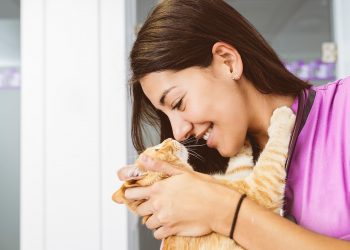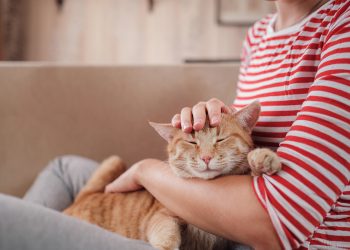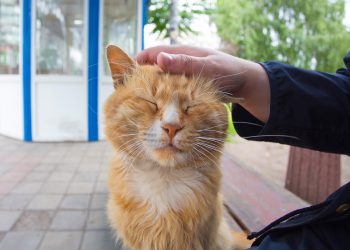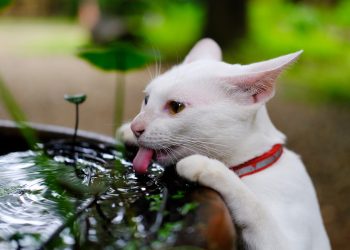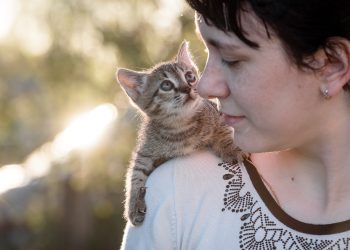Does your heavy breathing cat worry you?
Today we’re going to discuss bad breath in cats and feline breathing issues. If your cat is breathing heavily, there’s something amiss, and you should take action quickly.
Why Is My Cat Heavy Breathing?
Cat heavy breathing is a symptom and not the exact medical condition. Therefore, the safest recourse is to consult with your vet if you feel that the heavy breathing is out of the ordinary.
These are the most common causes of feline respiratory distress:
- FIP – This is a feline viral condition that does not pass. It becomes fatal in one to two months. Fluids eventually accumulate in the cat’s lungs, resulting in eventual mortality.
- A cat’s lymphatic system collects fluid from different parts of the body, including fats from the intestinal cavity. Sometimes, the portion of the lymphatic system near the heart ruptures. When this happens, collected fluids from all over the body spill into the chylothorax region. The accumulation of fluid in this area of the body causes compression of the lung area and the heart.
- The third most common cause of breathing problems in cats is cardiomyopathy. Cardiomyopathy eventually wears down the heart and triggers congestion and, eventually, cardiac failure.

Is your cat having trouble breathing?
The medical term for heavy breathing is dyspnea. Dyspnea has many possible manifestations:
- There may be stridor or noise while breathing (sometimes with outright vocalization)
- Expiratory dyspnea happens when a cat has difficulty pushing out air from the lungs.
- Inspiratory dyspnea prevents a cat from breathing in air.
- The head of the cat is extended and lower than the shoulders to improve the flow of air.
- The cat’s elbows may be extended while it lays flat to the ground.
- The cat may be breathing with a wide-open mouth.
- There may be observable flaring of the nostrils.
- The chest moves like the belly while breathing (this is often seen as panting)
Some cats may also exhibit additional symptoms apart from dyspnea. When a cat’s breathing suddenly increases in speed, it is experiencing tachypnea. Tachypnea normally forces the cat to close its mouth, and all the fast breathing is done through the nostrils. Panting occurs when the feline’s mouth is wide open, and it takes mostly audible and shallow breaths. Panting is another form of abnormally fast breathing.

What do I do if my cat is breathing heavily?
Not much can be done to improve the state of a cat experiencing breathing difficulties. Your cat needs to get to a veterinarian at the soonest possible time. During this time, keep your cat as comfortable as possible and provide gentle comfort to the animal. You may not be able to touch what is causing the breathing difficulty, but you can reduce the stress, making things harder for your cat. Be sure to place your cat in a box or carrier with sufficient ventilation holes. This is incredibly important as your cat is already experiencing respiratory distress.
Cat Bad Breath
If your cat has bad breath, your feline companion may have one of many possible issues that cause a change in the oral cavity’s odor. The most common cause, according to veterinarians, is periodontal disease. Unless you clean your cat’s mouth regularly, your cat’s mouth may have some bad teeth, gum disease, etc. There is no work-around tooth problems and the like. You need to bring in your cat for some dental work before the issues worsen and your cat’s breath stinks even more.
Periodontal issues are not minor. Eventually, plaque that builds upon the teeth can make your cat’s gum swell with infection. The infection can lead to ulcerations inside the cat’s mouth. The infection can also spread to tissues beyond the oral cavity. This poses a risk to other organs, including the heart. Complicated periodontal disease can be incredibly dangerous.
Also, keep in mind that gingivitis can eat away at teeth, bone, and gum tissues. If you want your cat to have an easier time as it ages, you have to make sure that it has good oral health.
The second common cause of bad breath in cats is residual trapped food. Trapped food can become stuck between teeth or along the gum line. Normally, the sandpaper-like tongue of cats can remove leftover food. However, food debris can get stuck, so you may have to remove these leftover foods manually.

A cat’s breath can also indicate possible chronic conditions. For example, cat breath that smells sickly sweet may indicate diabetes. If the breath smells like your cat’s urine, then it’s like that your cat is battling kidney disease at the moment. A foul odor may indicate intestinal disease and blockages. Wounds, ulcerations, and growths within the oral cavity can also cause foul odors, so a wellness check is always recommended to catch these problems early.
How can you stave off bad breath in cats? The most sensible and effective method for preventing bad breath in felines is daily brushing. Just imagine the smell of your mouth if you didn’t brush properly. It’s not going to be pleasant, for sure. The same principle applies to cats. They need to be brushed, too.
When brushing your cat’s teeth, always be mindful that it’s not your mouth that is being pried open. Instead of trying to open the mouth all the way, pull back the lips and brush the teeth from the outside. Take things as slowly as you can so your cat grows accustomed to the finger brush and the non-toxic toothpaste.
And finally, we’d like to point out that unless your cat uses mouthwash (they don’t), your cat’s breath will probably smell of its last meal. And sometimes, the last meal is a dead rat, and that’s okay.
![]()
Next on your reading list:

